

11 Cognitive Biases That Influence Political Outcomes. With the 2020 U.S. presidential election fast approaching, many people will be glued to the 24-hour news cycle to stay up to date on political developments.
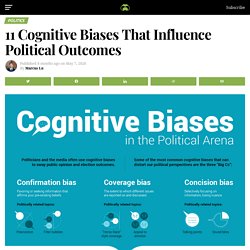
Google searches to buy chloroquine spiked by 442% following Donald Trump and Elon Musk’s endorsements of the drug for treating COVID-19. 11 Cognitive Biases That Influence Political Outcomes. Cognitive Biases and the Human Brain. I am staring at a photograph of myself that shows me 20 years older than I am now. I have not stepped into the twilight zone. Rather, I am trying to rid myself of some measure of my present bias, which is the tendency people have, when considering a trade-off between two future moments, to more heavily weight the one closer to the present. A great many academic studies have shown this bias—also known as hyperbolic discounting—to be robust and persistent. To hear more feature stories, see our full list or get the Audm iPhone app. Most of them have focused on money. The Cognitive Bias President Trump Understands Better Than You. Americans born in the United States are more murderous than undocumented immigrants.
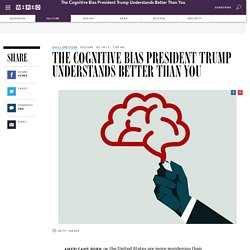
Fighting words, I know. But why? After all, that’s just what the numbers say. Still, be honest: you wouldn’t linger over a story with that headline. It’s “dog bites man.” The problem here is not just that this singling out creates a distorted, fish-eye lens version of what’s really happening. You know who else isn’t as likely to commit murders in the US as native-born citizens? Confirmation Bias: How Intelligent People Develop Totally Incorrect Beliefs. Study debunks long-held myth probably arising from the confirmation bias.

The full moon is NOT linked to busier hospital emergency rooms or more births, a new study finds. The belief that there might be a link is likely down to a bias in the way even intelligent people think called the confirmation bias. Dunning–Kruger effect - Wikipedia. Cognitive bias in which people with low ability at a task overestimate their ability In the field of psychology, the Dunning–Kruger effect is a cognitive bias in which people with low ability at a task overestimate their ability.
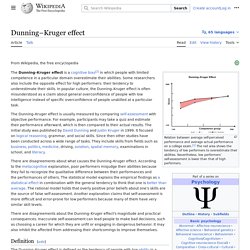
It is related to the cognitive bias of illusory superiority and comes from the inability of people to recognize their lack of ability. Without the self-awareness of metacognition, people cannot objectively evaluate their competence or incompetence. As described by social psychologists David Dunning and Justin Kruger, the bias results from an internal illusion in people of low ability and from an external misperception in people of high ability; that is, "the miscalibration of the incompetent stems from an error about the self, whereas the miscalibration of the highly competent stems from an error about others".[1] Colloquially, people experiencing this bias are said to be "on Mount Stupid".[2][3] Original study[edit] Later studies[edit] Mathematical critique[edit] Cognitive bias cheat sheet – Better Humans.
Capital - How to stop lying to yourself. Newly divorced, Eleanor Bain thought she’d finally met the man of her dreams.

She was in a new city, looking for a new job and starting a new life with her two daughters, when she fell in love, or so she thought. It’s like a boomerang, when you suddenly realise that this is not so peachy But along with the positives of shared interests, there were plenty of negatives. Sometimes the pair ended up screaming at each other for hours on end. Looking back, Bain says she was in denial about the relationship. Chilcot: Why we cover our ears to the facts. Image copyright Getty Images Do people moderate their views when presented with overwhelming evidence to the contrary?

Not necessarily, writes Matthew Syed. List of fallacies. Because of their variety of structure and application, fallacies are challenging to classify so as to satisfy all practitioners.

Fallacies can be classified strictly by either their structure or content, such as classifying them as formal fallacies or informal fallacies, respectively. The classification of informal fallacies may be subdivided into categories such as linguistic, relevance through omission, relevance through intrusion, and relevance through presumption.[1] On the other hand, fallacies may be classified by the process by which they occur, such as material fallacies (content), verbal fallacies (linguistic), and again formal fallacies (error in inference).
In turn, material fallacies may be placed into the more general category of informal fallacies, while formal fallacies may be clearly placed into the more precise category of logical (deductive) fallacies. Relatively Interesting Logical Fallacies in the Lab - Relatively Interesting. Errors in reasoning aren’t limited to just us regular folk.
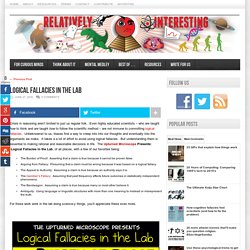
Even highly educated scientists – who are taught how to think and are taught how to follow the scientific method – are not immune to committing logical fallacies. Theconversation. What happens to your brain when you walk into a shop and are faced with a huge, ultra-high definition, 3D television at the startling price of £37,695?

Assuming you actually need a new TV, you might dismiss this as ridiculous; laugh at the spendthrift fools who might buy it. And then, very sensibly, you start looking at more reasonably priced options, maybe at around the £1,500 mark. You have just been successfully manipulated. Welcome to the world of anchoring. Relatively Interesting A visual guide to Cognitive Biases - Relatively Interesting. Cognitive biases are psychological tendencies that cause the human brain to draw incorrect conclusions.
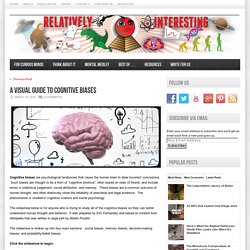
Such biases are thought to be a form of “cognitive shortcut”, often based on rules of thumb, and include errors in statistical judgement, social attribution, and memory. These biases are a common outcome of human thought, and often drastically skew the reliability of anecdotal and legal evidence. The phenomenon is studied in cognitive science and social psychology.
The slideshow below is for anyone who is trying to study all of the cognitive biases so they can better understand human thought and behavior. It was prepared by Eric Fernandez and based on content from Wikipedia that was written in large part by Martin Poulter. The slideshow is broken up into four main sections: social biases; memory biases; decision-making biases; and probability/belief biases. Click the slideshow to begin. Cognitive biases that affect decisions. Why You’re Biased About Being Biased. In a classic experiment in 1953, students spent an hour doing repetitive, monotonous tasks, such as rotating square pegs a quarter turn, again and again. Then the experimenters asked the students to persuade someone else that this mind-numbing experience was in fact interesting. Some students got $1 ($9 today) to tell this fib while others got $20 ($176 today). In a survey at the end of the experiment, those paid only a trivial fee were more likely to describe the boring activity as engaging.
They seemed to have persuaded themselves of their own lie. According to the researchers, psychologists Merrill Carlsmith and Leon Festinger, this attitude shift was caused by “cognitive dissonance,” the discomfort we feel when we try to hold two contradictory ideas or beliefs at the same time. List of cognitive biases. Systematic patterns of deviation from norm or rationality in judgment The loss aversion cognitive bias has been shown in monkeys. Cognitive bias. Some cognitive biases are presumably adaptive. Cognitive biases may lead to more effective actions in a given context.[6] Furthermore, allowing cognitive biases enable faster decisions which can be desirable when timeliness is more valuable than accuracy, as illustrated in heuristics.[7] Other cognitive biases are a "by-product" of human processing limitations,[8] resulting from a lack of appropriate mental mechanisms (bounded rationality), or simply from a limited capacity for information processing.[9][10] A continually evolving list of cognitive biases has been identified over the last six decades of research on human judgment and decision-making in cognitive science, social psychology, and behavioral economics.
Kahneman and Tversky (1996) argue that cognitive biases have efficient practical implications for areas including clinical judgment, entrepreneurship, finance, and management.[11][12] Overview[edit] Types[edit] What Is a Cognitive Bias? When we are making judgments and decisions about the world around us, we like to think that we are objective, logical, and capable of taking in and evaluating all the information that is available to us. The reality is, however, that our judgments and decisions are often riddled with errors and influenced by a wide variety of biases. The human brain is both remarkable and powerful, but certainly subject to limitations. Being Really, Really, Ridiculously Good Looking.